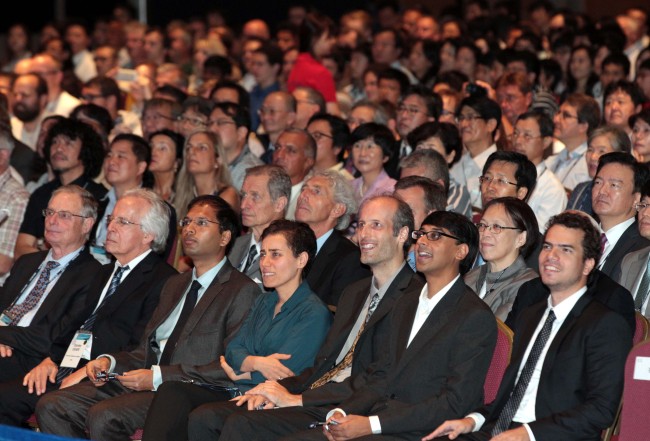Maryam Mirzakhani, the first female mathematician to win the Fields Medal, the most prestigious honor in mathematics, said confidence is what it takes to make such achievements.
“Confidence is what makes a big difference,” said the mathematician at a press conference at the 2014 International Congress of Mathematicians in Seoul on Wednesday. “It is not your talent, but about thinking that you can do it.”
The Fields Medal is an award created to commemorate John Charles Fields, a world-renown Canadian mathematician. Often dubbed the Nobel Prize of math, it is given to two to four mathematicians under the age of 40 found to have made the most significant contributions toward the advancement of mathematics over a period of four years. So far, 52 male mathematicians have received the award.
Mirzakhani, currently a Stanford University professor, became the first female recipient since the award’s establishment in 1936. Three others ― Artur Avila, a Brazilian-French researcher, Manjul Bhargava, a Canadian-American number theorist at Princeton University, and Martin Hairer, a math professor at the University of Warwick in the U.K. ― also received the medal.
 |
(From right) Fields Medal winners Artur Avila, Manjul Bhargava, Martin Hairer and the first-ever female winner Maryam Mirzakhani attend the International Congress of Mathematicians in Seoul on Wednesday. (Park Hyun-koo/The Korea Herald) |
She was recognized for her original contributions in the fields of hyperbolic geometry and dynamical systems, in particular the symmetry of curved surfaces and the surfaces of doughnuts.
At the conference, Mirzakhani noted that math is the basic medium for science and technology, indicating that it has the potential to bring about a bigger impact on a wide range of fields.
Born in Iran in 1977, the professor earned her Ph.D at Harvard University in 2004, and served as an assistant professor at Princeton University from 2004 to 2008.
Giving advice on how to get kids interested in mathematics ― a subject often regarded as the most difficult at school ― other recipients said it was up to the parents not to give a bad impression of math.
“People say that math is difficult, and children often become afraid of math at an early age,” said Hairer, adding that children can actually understand much more than people think.”
Other participants of the conference gave advice on how to bolster the Korean math sector.
“Korea’s math sector grew over the years in terms of quantity, but it should now put more focus on qualitative growth,” said Park Hyung-ju, chairman of the Seoul International Congress of Mathematicians 2014 Organizing Committee.
“I hope by hosting the ICM, we can inspire younger generations to become more involved in math and make achievements that can compare with those of the recipients of this year’s ICM awards,” he added.
Meanwhile, the International Mathematical Union, the global organizer of the ICM, announced the winners of other prizes, including Subhash Khot of New York University who won the Rolf Nevanlinna Prize and Stanley Osher from the University of California, Los Angeles, who won the Carl Friedrich Gauss Prize.
Phillip Griffiths of Princeton University was named the winner of the Chern Medal, and the Leelavati Prize went to Argentinian professor Adrian Paenza.
By Kim Young-won (
wone0102@heraldcorp.com)






![[Exclusive] Hyundai Mobis eyes closer ties with BYD](http://res.heraldm.com/phpwas/restmb_idxmake.php?idx=644&simg=/content/image/2024/11/25/20241125050044_0.jpg)
![[Herald Review] 'Gangnam B-Side' combines social realism with masterful suspense, performance](http://res.heraldm.com/phpwas/restmb_idxmake.php?idx=644&simg=/content/image/2024/11/25/20241125050072_0.jpg)
